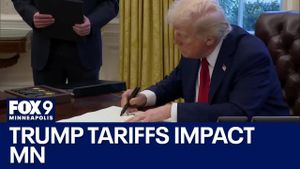Elon Musk, the billionaire entrepreneur and CEO of Tesla and SpaceX, has taken center stage in President Donald Trump’s efforts to streamline the federal government, announcing plans to eliminate the United States Agency for International Development (USAID). During a social media discussion on X, Musk was joined by notable figures including former Republican presidential candidate Vivek Ramaswamy, and Senators Joni Ernst and Mike Lee, where he declared, "It’s beyond repair." This blunt assessment underlines the administration's significant push to cut federal expenses.
Musk's remarks come as reports indicate significant administrative shake-ups within USAID, which is the world's largest single donor organization. The Trump administration reportedly dismissed two top security officials over the weekend after they tried to prevent Musk's Department of Government Efficiency (DOGE) from accessing restricted areas within the agency. WAR-2023 alone saw the United States disburse approximately $72 billion globally, funding initiatives ranging from women’s health to energy security and anti-corruption efforts. Without USAID, many of these humanitarian projects could be jeopardized, as the agency accounted for around 42% of all UN-tracked humanitarian assistance this year.
With Trump’s directive to freeze most U.S. foreign aid, concerns have arisen over the potential consequences on aid programs across the globe. Initiatives like field hospitals for refugees, landmine clearance operations, and life-saving treatments for diseases such as HIV could face devastating cuts. Musk, aiming to bolster his cost-cutting agenda, estimates the administration could cut up to $1 trillion from the U.S. deficit over the next year, emphasizing the need for government efficiency.
Despite the ambitious and sweeping claims made by Musk, he has yet to provide substantial evidence supporting his statements about fraud being perpetrated through fake digital U.S. identities or details on how the predicted $1 trillion savings would be realized. His statements have ignited significant political scrutiny, particularly from Democrats. Senator Peter Welch raised alarms over Musk's access to the Treasury payment system, which handles over $6 trillion annually, expressing concerns about taxpayer data protection and governance. Welch asserted, "It’s a gross abuse of power by an unelected bureaucrat and it shows money can buy power in the Trump White House."
Despite these concerns, Trump continues to support Musk, praising his capabilities and continual efforts to reduce federal expenditures. “He’s a big cost-cutter. Sometimes we won’t agree with it and we’ll not go where he wants to go. But I think he’s doing a great job. He’s very smart and very much focused on cutting our federal budget,” Trump commented during recent discussions. This endorsement reinforces Musk's significant influence within the administration.
The DAO and extensive changes within the federal agencies signal not only Trump’s commitment to reducing government spending but also Musk’s increasingly formidable role within governmental operations. During Musk's tenure since Trump took office, there have been numerous reports of career civil servants being sidelined and removed from decision-making processes, allowing individuals affiliated with Musk to direct operations within significant agencies, including the Office of Personnel Management (OPM).
These developments have raised alarms about transparency, accountability, and the future of U.S. foreign aid and humanitarian efforts worldwide. The relationships Musk has cultivated through his access to high-level government systems continue to evolve, but the overarching narrative remains: the discussion on the efficacy of USAID and federal foreign aid allocations will undoubtedly heat up as Musk's initiatives progress.
For many industry experts and humanitarian advocates, the ramifications of shutting down USAID could lead to devastating impacts on global aid programs and the various populations who rely on them. While Musk and Trump promote their budgetary strategies, the challenge remains: how to balance fiscal discipline with the urgent needs of vulnerable populations worldwide. The next few months are bound to reveal the true outcomes of these policy decisions on both American administration and global humanitarian assistance.



